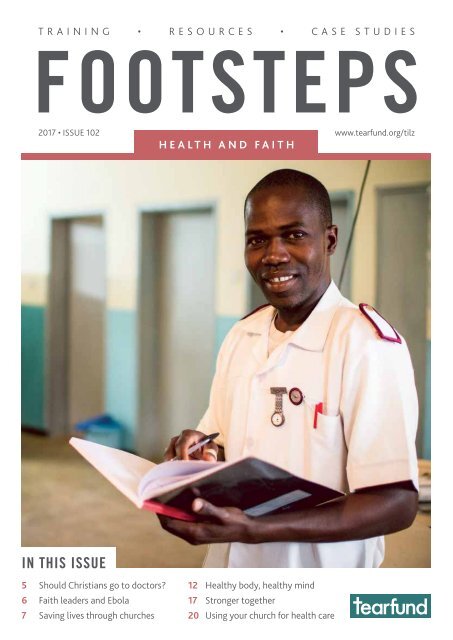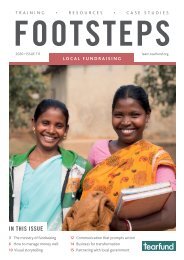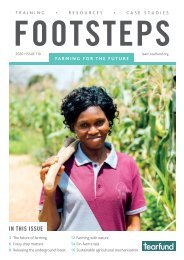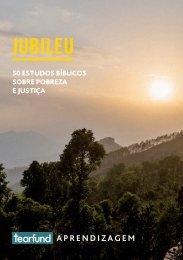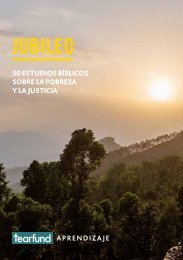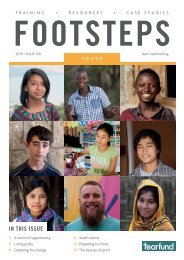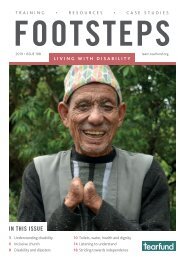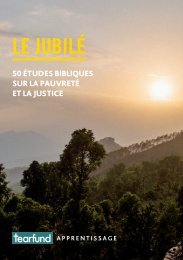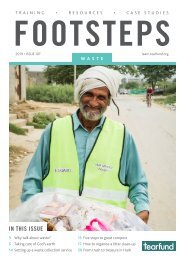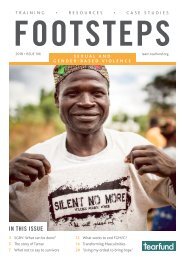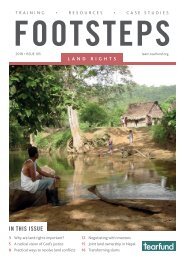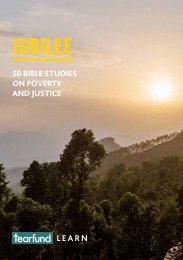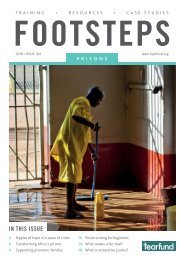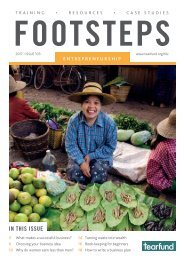Footsteps 102: Health and faith
Create successful ePaper yourself
Turn your PDF publications into a flip-book with our unique Google optimized e-Paper software.
TRAINING • RESOURCES • CASE STUDIES<br />
FOOTSTEPS<br />
2017 • ISSUE <strong>102</strong> www.tearfund.org/tilz<br />
HEALTH AND FAITH<br />
IN THIS ISSUE<br />
5 Should Christians go to doctors?<br />
6 Faith leaders <strong>and</strong> Ebola<br />
7 Saving lives through churches<br />
12 <strong>Health</strong>y body, healthy mind<br />
17 Stronger together<br />
20 Using your church for health care
IN THIS ISSUE<br />
FOOTSTEPS<br />
H E A L T H A N D F A I T H<br />
FEATURES<br />
3 Faith, the church <strong>and</strong> health care<br />
7 Saving lives through churches<br />
in Nepal<br />
8 Faith communities <strong>and</strong> mental<br />
health<br />
9 Speaking out for better health<br />
12 <strong>Health</strong>y body, healthy mind<br />
14 Community <strong>Health</strong> Evangelism<br />
17 Stronger together<br />
20 Using your church building for<br />
health care<br />
REGULARS<br />
5 BIBLE STUDY: Should Christians<br />
go to doctors?<br />
6 INTERVIEW: How <strong>faith</strong> leaders<br />
helped beat Ebola<br />
15 CHILDREN’S ZONE<br />
16 INTERVIEW: How my <strong>faith</strong><br />
inspires my work<br />
18 RESOURCES<br />
19 COMMUNITY<br />
From the earliest years of the church, Christians have been<br />
involved in health care. In Roman times there were no public<br />
clinics or hospitals. The sick were sometimes even left to die in<br />
the streets. But the early Christians believed God wanted them<br />
to care for all who were suffering. When a terrible plague hit the<br />
Roman Empire, it was the Christians who took care of the sick <strong>and</strong><br />
dying. They did this despite the risks to their own health <strong>and</strong> the<br />
persecution they faced under the Romans.<br />
Today, God is still calling us to show his compassion <strong>and</strong> love by<br />
caring for the sick. The church can play a special role in offering<br />
spiritual <strong>and</strong> psychological support as well as practical health care.<br />
It is also an excellent platform for spreading accurate messages<br />
about how to stay healthy.<br />
In this edition you can read about the way <strong>faith</strong> leaders helped to<br />
beat the Ebola outbreak in Sierra Leone (page 6). We tackle the<br />
question of how <strong>faith</strong> communities can help people with mental<br />
health problems (page 8). We also feature the Community <strong>Health</strong><br />
Evangelism approach, where local Christian volunteers spread<br />
messages of health <strong>and</strong> hope (page 14). And we discuss ways<br />
you can use your church building to help people stay healthy<br />
(page 20).<br />
I would like to say a big thank you to everyone who responded<br />
to my email asking for stories about <strong>faith</strong> <strong>and</strong> health care in your<br />
communities. Your responses were both fascinating <strong>and</strong> inspiring,<br />
<strong>and</strong> they helped me select the topic of the Bible study (page 5).<br />
I have included a selection of your letters on page 19.<br />
Please do get in touch with more of your ideas <strong>and</strong> knotty<br />
problems! Our next edition will be about entrepreneurship <strong>and</strong><br />
what makes a business successful.<br />
Zoe Murton – Editor<br />
TAKE AND USE<br />
10 POSTER: First aid – how to deal<br />
with choking<br />
13 Seven easy exercises<br />
PS You may have noticed that my surname has changed. Several<br />
months ago I got married <strong>and</strong> moved to Kenya, where my<br />
husb<strong>and</strong> works. I am excited to be living in the same country as<br />
so many <strong>Footsteps</strong> readers!<br />
Cover shows a health worker in Malawi, where Tearfund partner Livingstonia<br />
Synod AIDS Programme (LISAP) has organised groups of churches to work with<br />
people living with HIV. Photo: Chris Boyd/Tearfund<br />
2 FOOTSTEPS <strong>102</strong>
y Dr Ted Lankester<br />
FAITH, THE CHURCH AND<br />
HEALTH CARE<br />
I spent quite a few years in my earlier life<br />
trying to work out whether God exists.<br />
One day I thought to myself: ‘If God<br />
does exist <strong>and</strong> if he is a God of love, as<br />
people tell me, then surely he will make<br />
himself known to me.’<br />
Within one week <strong>and</strong> after years of<br />
searching, I felt changed, transformed<br />
<strong>and</strong> certain. I started to read the Bible<br />
more carefully <strong>and</strong> I came across what I<br />
now call ‘The Nazareth Manifesto’ (Luke<br />
4:17–19). When Jesus first stood up to<br />
tell the world who he was <strong>and</strong> what he<br />
had come to do, his mission statement<br />
was so simple. It was to bring good news<br />
to the poor, recovery of sight to the<br />
blind <strong>and</strong> freedom for those who were<br />
oppressed.<br />
What a great vision! Is that ours, too?<br />
In Matthew’s gospel (chapter 25:37–45)<br />
we are given a bit more detail. We are<br />
told that when God finally sets his<br />
approval (or not) on what we have done<br />
in life, he will ask whether we have fed<br />
the hungry <strong>and</strong> cared for the sick.<br />
What higher priority than that does<br />
health <strong>and</strong> development work receive?<br />
A HEALTHY PARTNERSHIP<br />
A recent report by the World <strong>Health</strong><br />
Organization estimates that between 30<br />
<strong>and</strong> 70 per cent of health care in Africa<br />
is provided by <strong>faith</strong>-based organisations.<br />
That seems to show that many people<br />
are taking God at his word.<br />
But there is more. A recent study has<br />
shown that more than four out of five<br />
people worldwide have a religious <strong>faith</strong>.<br />
In many countries it is far higher.<br />
I have been thinking a lot about these<br />
issues – how <strong>faith</strong> <strong>and</strong> health go together.<br />
It seems to me that health workers who<br />
are enriched by <strong>faith</strong> in God need to<br />
have two priorities. The first is sharing<br />
<strong>and</strong> demonstrating the wonder of<br />
knowing God to friends, neighbours <strong>and</strong><br />
acquaintances. The second is to share<br />
our God-given knowledge of science <strong>and</strong><br />
how to live healthy lives with our friends<br />
<strong>and</strong> communities (<strong>and</strong> of course to<br />
demonstrate it as well!).<br />
A LOT WE CAN ALL DO<br />
I lived with my family of five in a remote<br />
part of the Himalayas for many years.<br />
Most people there had no access to health<br />
care. So we worked with community<br />
members to find solutions. Together, we<br />
worked out ways to prevent <strong>and</strong> cure<br />
many illnesses by utilising local resources,<br />
training community health workers <strong>and</strong><br />
using a few essential medicines. We<br />
found that up to four out of five illnesses<br />
could be prevented, cured or improved at<br />
community level.<br />
Most of the ill health in that community<br />
was caused by infectious illness,<br />
poor nutrition <strong>and</strong>, increasingly, noncommunicable<br />
diseases such as diabetes.<br />
But simple guidelines apply to all of us,<br />
urban or rural, rich or poor. If we eat<br />
healthy, nutritious food, remain at an ideal<br />
weight <strong>and</strong> take regular exercise (whether<br />
in our fields, streets or gyms), we can<br />
prolong our life. This is not just for our own<br />
benefit, but so we can support our families,<br />
our communities <strong>and</strong> our country.<br />
Eating healthy, nutritious food can help us live longer. Photo: Andrew Philip/Tearfund<br />
FOOTSTEPS <strong>102</strong><br />
3
Last year I visited the Anglican cathedral<br />
in Freetown, Sierra Leone. I was delighted<br />
to hear from the dean that they were<br />
getting involved in health care, despite<br />
all the problems the country has faced.<br />
On a recent Sunday, members of the<br />
congregation were encouraged to have<br />
their blood pressure taken by doctors<br />
after the evening service. High blood<br />
pressure is now the biggest cause of<br />
death worldwide. So blood pressure<br />
testing can be an excellent extra blessing<br />
that church leaders can bring to their<br />
congregation <strong>and</strong> community.<br />
Wise advice <strong>and</strong> simple improvements<br />
can often give us further years of<br />
healthy life, so we can continue to<br />
enjoy <strong>and</strong> serve God’s world. Surely<br />
something this valuable is worth talking<br />
about in our sermons, our schools <strong>and</strong><br />
our Bible colleges?<br />
IS IT ALWAYS A GOOD STORY?<br />
The relationship between <strong>faith</strong> <strong>and</strong><br />
health care is often good news – but<br />
not always. We do have to be aware of<br />
some difficult questions about negative<br />
aspects of <strong>faith</strong> <strong>and</strong> health. I will<br />
mention two important ones.<br />
The first is this: some people believe that<br />
<strong>faith</strong> alone will cure their illness. So for<br />
example, if they are taking antiretroviral<br />
treatment for HIV, they throw away<br />
their medicines. Many people have died<br />
because of this dangerous <strong>and</strong> foolish<br />
advice based on wrong theology. Did not<br />
the God who created <strong>faith</strong> also create<br />
the world? Of course he did. The God<br />
who loves us also gives us science <strong>and</strong><br />
medicine to show his care for us.<br />
Many of us give thanks or say ‘grace’<br />
before meals, asking God to bless<br />
the food for our bodies. In the same<br />
way, when I take my medicines each<br />
morning to control my blood pressure<br />
<strong>and</strong> lower my cholesterol, I say thank<br />
you to God for each of them. They help<br />
me to go on a 7km run most weekends<br />
<strong>and</strong> to keep serving my family,<br />
community <strong>and</strong> patients.<br />
The second difficult issue is this: <strong>faith</strong><br />
<strong>and</strong> health care sometimes seem to<br />
clash with each other. <strong>Health</strong> practices<br />
based on evidence <strong>and</strong> good practice<br />
may challenge certain beliefs held by<br />
some sectors of the church (<strong>and</strong> some<br />
other <strong>faith</strong>s). One example is in certain<br />
areas of sexual <strong>and</strong> reproductive health.<br />
I am going to be a bit controversial for<br />
some readers by saying that I believe<br />
the use of contraceptives has prevented<br />
large numbers of unwanted children <strong>and</strong><br />
saved the dignity, health <strong>and</strong> freedom of<br />
countless women. We can be thankful<br />
to God for this <strong>and</strong> use contraceptives in<br />
a way that honours God, not as an easy<br />
way into promiscuity.<br />
AS TEACHERS, IS IT OK TO<br />
TALK ABOUT FAITH?<br />
The Lancet is one of the world’s leading<br />
journals on medicine <strong>and</strong> global health. In<br />
2015, for the first time it devoted an entire<br />
edition to the role of <strong>faith</strong> in health care.<br />
This was one of its conclusions:<br />
‘Faith-based organisations deliver a<br />
substantial volume of health care, <strong>and</strong><br />
their common visions of stewardship,<br />
inclusiveness, dignity, <strong>and</strong> justice make<br />
many such organisations ideally suited as<br />
key partners for delivering the post-2015<br />
Sustainable Development Goals’ (William<br />
Summerskill <strong>and</strong> Richard Horton).<br />
Some of you reading this article will<br />
be teachers in schools, colleges <strong>and</strong><br />
universities. You may be reluctant<br />
to bring the topic of <strong>faith</strong> into your<br />
health teaching, because it appears<br />
to be separate or unscientific. But is<br />
it? The Lancet has endorsed its value.<br />
We know that church-based hospitals,<br />
health centres <strong>and</strong> community health<br />
programmes are saving thous<strong>and</strong>s of lives<br />
every day. So although we need to be<br />
aware of regulations, we do indeed have<br />
‘permission’ to speak about the role of<br />
<strong>faith</strong> in the secular world. And if we fail<br />
to speak up, we are not giving the full<br />
message about the vital role of <strong>faith</strong>based<br />
organisations in the modern world.<br />
OUR RESPONSE<br />
••<br />
If you are a pastor or a church leader,<br />
please use the position of respect you<br />
hold to promote good health to your<br />
congregations <strong>and</strong> community.<br />
••<br />
If you are a health <strong>and</strong> development<br />
worker, please enjoy the recent research<br />
that allows <strong>and</strong> encourages you to bring<br />
<strong>faith</strong> into your work <strong>and</strong> teaching.<br />
••<br />
If you are working for a secular<br />
NGO, consider discussing <strong>faith</strong> issues<br />
respectfully with the people you are<br />
working with.<br />
For all of us, let us thank God that he<br />
created our <strong>faith</strong>, he created our world<br />
<strong>and</strong> he created ways for us to prevent<br />
<strong>and</strong> cure illness. We can be very grateful<br />
for the wonderful gifts of <strong>faith</strong>, health<br />
<strong>and</strong> creativity he invites us to work with<br />
<strong>and</strong> enjoy.<br />
Ted Lankester is the Director of <strong>Health</strong><br />
Services at Inter<strong>Health</strong>. He is also the<br />
co-founder <strong>and</strong> Director of Community<br />
<strong>Health</strong> Global Network (CHGN).<br />
Websites: www.chgn.org<br />
www.interhealthworldwide.org<br />
Email: team@chgn.org<br />
Churches can help<br />
their communities<br />
access blood pressure<br />
testing <strong>and</strong> other<br />
health services.<br />
4 FOOTSTEPS <strong>102</strong>
God gives us the<br />
responsibility to seek<br />
medical treatment as well<br />
as to pray for healing.<br />
BIBLE STUDY<br />
SHOULD CHRISTIANS GO TO DOCTORS?<br />
There are some Christians who believe<br />
that seeking medical help shows a lack<br />
of <strong>faith</strong> in God. Some Christians wrongly<br />
think they should throw away their<br />
medicines <strong>and</strong> only pray for healing.<br />
When we think about how we behave in<br />
other areas of our lives, we see that this<br />
is not a logical view. If your bicycle breaks<br />
down, do you take it to a mechanic or wait<br />
for God to perform a miracle <strong>and</strong> heal it?<br />
If the roof of your house develops a leak,<br />
do you wait for God to mend it, or do you<br />
fix it yourself? God is just as capable of<br />
repairing a bicycle or mending a roof as he<br />
is of healing our bodies. The fact that God<br />
can <strong>and</strong> does perform miracles of healing<br />
does not mean we should always expect a<br />
miracle. We should seek help from those<br />
with the knowledge <strong>and</strong> skill to assist us.<br />
WHAT DOES THE BIBLE SAY<br />
ABOUT DOCTORS?<br />
Many verses in the Bible speak of using<br />
medical treatments that were common<br />
at the time. These include applying:<br />
••<br />
b<strong>and</strong>ages (Isaiah 1:6)<br />
••<br />
oil (James 5:14)<br />
••<br />
oil <strong>and</strong> wine (Luke 10:34)<br />
••<br />
leaves (Ezekiel 47:12)<br />
••<br />
balm (Jeremiah 8:22).<br />
We know that Luke, the author of Acts<br />
<strong>and</strong> the gospel of Luke, was a doctor<br />
(Colossians 4:14). And Paul once gave<br />
Timothy advice on medical treatment<br />
(1 Timothy 5:23).<br />
Doctors are referred to about 12 times<br />
in the Bible. The only verse that could be<br />
wrongly used to teach that we should<br />
not consult doctors is 2 Chronicles 16:12:<br />
‘In the thirty-ninth year of his reign Asa<br />
was afflicted with a disease in his feet.<br />
Though his disease was severe, even in his<br />
illness he did not seek help from the Lord,<br />
but only from the physicians.’<br />
The problem was not that Asa consulted<br />
physicians, but that ‘he did not seek help<br />
from the Lord’ as well. We should always<br />
seek help from God as well as going for<br />
appropriate medical treatment – not<br />
instead of doing so.<br />
In Matthew 9, the Pharisees asked Jesus<br />
why he spent time with sinners. He<br />
replied, ‘It is not the healthy who need<br />
a doctor, but the sick’ (Matthew 9:12).<br />
Jesus recognised that sick people need<br />
doctors. He did not condemn using<br />
doctors <strong>and</strong> ‘earthly’ remedies. Yes, Jesus<br />
performed many healing miracles while<br />
he was on Earth. But these were partly to<br />
show people that he was the promised<br />
Messiah (Luke 4:18).<br />
HOW SHOULD WE RESPOND?<br />
So, should Christians go to doctors? Yes,<br />
absolutely. God created us as intelligent<br />
beings. He gave us the ability to create<br />
medicines <strong>and</strong> learn how to repair our<br />
bodies. Doctors are one of the ways in<br />
which God brings healing <strong>and</strong> recovery.<br />
Nevertheless, our experience is that in this<br />
fallen world not everyone is healed, <strong>and</strong> we<br />
do not underst<strong>and</strong> why. We know that Paul<br />
struggled with a problem he called ‘a thorn<br />
in [his] flesh’ (2 Corinthians 12:7). Whatever<br />
this problem was, God did not remove it<br />
but instead gave Paul the strength to bear<br />
it. It is only at the end of time that God<br />
‘will wipe every tear from [our] eyes’. Then,<br />
‘there will be no more death or mourning<br />
or crying or pain’ (Revelation 21:4). In<br />
the meantime, we know that God will<br />
strengthen <strong>and</strong> help us in whatever troubles<br />
we may experience.<br />
DISCUSSION<br />
QUESTIONS<br />
••<br />
Talk about a time you were sick. Did<br />
you get medical help? Did the church<br />
help? Did God give you strength?<br />
••<br />
How can we encourage people to seek<br />
medical help when they need it as well as<br />
praying for healing?<br />
This Bible study was adapted from an article<br />
on the ‘Got questions?’ website<br />
(www.gotquestions.org). Please note, opinions<br />
expressed in other articles on this site do not<br />
necessarily reflect the views of Tearfund.<br />
FOOTSTEPS <strong>102</strong><br />
5
INTERVIEW<br />
HOW FAITH LEADERS HELPED BEAT EBOLA<br />
Patricia Conteh was a Projects Officer<br />
for Tearfund in Sierra Leone when the<br />
Ebola virus hit the country in 2014. Here,<br />
she shares her memories of the way <strong>faith</strong><br />
leaders changed the direction of Ebola.<br />
What was it like when the Ebola<br />
outbreak hit Sierra Leone?<br />
Sierra Leoneans are very friendly <strong>and</strong> warm,<br />
<strong>and</strong> we love visitors. People are always<br />
going in <strong>and</strong> out of each other’s homes. But<br />
when Ebola came, that stopped.<br />
Messages started coming out that Ebola<br />
is here <strong>and</strong> Ebola kills. Most people had<br />
never heard about Ebola, so they did not<br />
know how to respond. It caused a divide<br />
even in homes. Husb<strong>and</strong>s were not sure<br />
if their wives had the disease, <strong>and</strong> wives<br />
were not sure of their husb<strong>and</strong>s. It was<br />
as if Ebola attacked the very essence of<br />
our culture.<br />
How did <strong>faith</strong> communities respond?<br />
At first, ignorance caused a lot of<br />
problems. Many churches denied that<br />
Ebola was a medical problem. They said<br />
it was a judgement from God because we<br />
were sinful. A lot of church leaders laid<br />
h<strong>and</strong>s on people <strong>and</strong> got infected, <strong>and</strong><br />
spread the virus further.<br />
People wanted to continue with<br />
traditional burial practices. The Muslims<br />
believed that dead bodies had to be<br />
washed <strong>and</strong> prayed over in a certain way.<br />
And Christians would cry over a dead<br />
person <strong>and</strong> touch them. These things<br />
increased the number of people infected.<br />
Christian <strong>and</strong> Muslim leaders were<br />
trained together <strong>and</strong> worked together.<br />
They looked at the Bible <strong>and</strong> Qur’an to<br />
find scriptures that supported the Ebola<br />
response. They held discussion groups<br />
<strong>and</strong> educated people together. That was<br />
very unusual in Sierra Leone.<br />
In Sierra Leone, there is a huge amount<br />
of trust <strong>and</strong> respect for <strong>faith</strong> leaders,<br />
so people listened to them. Everybody<br />
did what the pastor said: do not<br />
touch others, wash your h<strong>and</strong>s, wear<br />
protective clothing etc. Those things<br />
helped a lot.<br />
How did <strong>faith</strong> groups spread health<br />
messages about Ebola?<br />
Faith groups worked together with<br />
NGOs to spread health messages. Both<br />
Muslims <strong>and</strong> Christians used video <strong>and</strong><br />
radio broadcasts. Tearfund, Unicef <strong>and</strong><br />
other organisations sent posters to<br />
churches, which they put up around<br />
their communities. Scripture Union used<br />
dramas, songs <strong>and</strong> dances about how to<br />
respond to Ebola. Members of both the<br />
church <strong>and</strong> the mosque took part.<br />
What other support did churches<br />
provide?<br />
The church provided psychosocial <strong>and</strong><br />
spiritual support. Tearfund trained<br />
pastors <strong>and</strong> gave them phones so they<br />
could call people with Ebola. The pastors<br />
spoke to them <strong>and</strong> prayed with them<br />
over the phone. In this way they could<br />
offer support without risking infection.<br />
The pastors also provided spiritual<br />
support when somebody died.<br />
Churches gave practical help to people in<br />
quarantine (that is, kept in isolation for<br />
a period to ensure they would not infect<br />
others). Church members provided food,<br />
water <strong>and</strong> toiletries.<br />
A big part of Tearfund’s response was<br />
tackling stigma. If people are stigmatised,<br />
they will hide themselves instead of<br />
going to hospital. Church leaders spoke<br />
in their services about not stigmatising<br />
people with Ebola. In some communities,<br />
people who recovered from Ebola were<br />
rejected when they came back from<br />
the treatment centres. The church held<br />
community meetings to help the local<br />
people to accept them again.<br />
DISCUSSION<br />
QUESTIONS<br />
••<br />
How can <strong>faith</strong> leaders be prepared for<br />
possible health emergencies?<br />
••<br />
How can we reach out to isolated<br />
people in our communities? How can we<br />
tackle stigma?<br />
Email: patricia.conteh@tearfund.org<br />
Muslim <strong>and</strong> Christian <strong>faith</strong> leaders worked together to fight Ebola. Photo: Layton Thompson/Tearfund<br />
How did the <strong>faith</strong> leaders change<br />
their response?<br />
Faith leaders began to realise that<br />
Ebola was more than a spiritual issue.<br />
So the Council of Churches <strong>and</strong> the<br />
Inter‐Religious Council of Sierra Leone<br />
had a meeting. That was when the game<br />
changed. They asked the government to<br />
train them about Ebola.<br />
6 FOOTSTEPS <strong>102</strong>
y Jaya Thapa<br />
SAVING LIVES<br />
THROUGH<br />
CHURCHES<br />
IN NEPAL<br />
Rescue Network Nepal trains church volunteers in first aid.<br />
Photo: Rescue Network Nepal<br />
In March 2011, I was working in a<br />
hospital in the city of Lalitpur, Nepal.<br />
One day we received a phone call.<br />
A road traffic accident had taken place<br />
in Lalb<strong>and</strong>hi, a town many hours’ drive<br />
away. The people at the scene did not<br />
know how to help the victims.<br />
We could not think of a way to provide<br />
immediate help. Eventually, we<br />
contacted some friends in the area who<br />
took the victims to hospital. But this<br />
incident had made me think: there must<br />
have been a church near the accident<br />
site. This gave me a vision for training<br />
every church member in Nepal in first aid.<br />
Many areas of Nepal are remote <strong>and</strong> hard<br />
to access, a long way from hospitals <strong>and</strong><br />
clinics. But even in remote areas, there<br />
are churches. I realised that through local<br />
churches, we could form a network of first<br />
aiders across the country. So I decided to<br />
set up Rescue Network Nepal (RNN).<br />
FIRST STEPS<br />
First, we formed a team with some<br />
doctors <strong>and</strong> wrote a training manual<br />
on first aid. We then visited churches in<br />
different locations <strong>and</strong> talked with the<br />
pastors about first aid training. If the<br />
pastors were interested, we ran training<br />
courses for their church members. Soon,<br />
the news about our courses spread,<br />
<strong>and</strong> now we receive more requests for<br />
training than we can fulfil.<br />
HOW DOES THE TRAINING WORK?<br />
Each training session lasts for two full<br />
days. Ideally there should be between<br />
15 <strong>and</strong> 25 participants. This ensures that<br />
each person will get enough individual<br />
attention. We always begin with devotion<br />
<strong>and</strong> prayer. After this, the majority of<br />
teaching is h<strong>and</strong>s-on, practical learning.<br />
This helps participants to remember what<br />
they have learnt.<br />
RNN trainers teach the group how to<br />
respond to major accidents – for example,<br />
how to dress wounds or perform<br />
resuscitation. They also train participants<br />
on how to treat more minor injuries, such<br />
as burns, broken bones, animal bites,<br />
snake bites, sprains <strong>and</strong> cuts.<br />
Where possible, we focus on using local<br />
resources to treat injuries. For example,<br />
for splinting we use wooden sticks or any<br />
hard objects that are long <strong>and</strong> light, <strong>and</strong><br />
for b<strong>and</strong>aging we use clean triangular<br />
b<strong>and</strong>ages or scarves. We give each group<br />
a first aid kit <strong>and</strong> a stretcher, <strong>and</strong> provide<br />
training in how to use these.<br />
THE RESCUE NETWORK ZONE<br />
RNN has now trained 2,149 volunteers<br />
across Nepal. Rather than leave the<br />
trained communities to work individually,<br />
we help the community leaders share<br />
their contact details. We have created<br />
the Rescue Network Zone, a network<br />
running along the major roads across<br />
29 districts. If a serious accident occurs<br />
<strong>and</strong> victims need to be transported to<br />
a distant hospital, the RNN members<br />
can receive help <strong>and</strong> additional medical<br />
supplies from the villages along the way.<br />
Similarly, if there is a natural disaster,<br />
these communities can now organise a<br />
response together.<br />
SEEING THE IMPACT<br />
We have heard many stories of church<br />
volunteers putting their training into<br />
practice. To give just one example, a<br />
mother named Sita was able to save the<br />
life of her young son when he choked<br />
on a biscuit. Sita said that without her<br />
RNN training, she would simply have<br />
panicked.<br />
We have seen a great impact as a result<br />
of church volunteers offering first aid.<br />
As well as helping in emergencies, the<br />
volunteers also provide support at local<br />
gatherings such as sporting events.<br />
Community members know they can<br />
ask the volunteers whenever they need<br />
any help.<br />
DISCUSSION<br />
QUESTION<br />
••<br />
Could some of your church members<br />
get trained in first aid <strong>and</strong> offer this<br />
service to your community? Red Cross/<br />
Red Crescent Societies <strong>and</strong> St John<br />
Ambulance offer training courses<br />
around the world.<br />
Jaya Thapa is the Director of Rescue<br />
Network Nepal.<br />
Website: www.rnnepal.wordpress.com<br />
Email: rescuenetwork.nepal@gmail.com<br />
FOOTSTEPS <strong>102</strong><br />
7
y Dr Julian Eaton<br />
FAITH COMMUNITIES<br />
AND MENTAL HEALTH<br />
Religious or spiritual leaders are often<br />
the first people individuals turn to in<br />
times of personal crisis. They can bring<br />
wisdom, healing <strong>and</strong> reconciliation.<br />
People often seek this kind of support if<br />
they have an illness, whether physical<br />
or mental. In both cases, people are<br />
looking for spiritual comfort. But they<br />
may also need to be directed to an<br />
appropriate medical expert.<br />
WHAT ARE MENTAL HEALTH<br />
PROBLEMS?<br />
Mental health problems affect people’s<br />
emotions, mood, thinking or behaviour.<br />
They are very common. About one in four<br />
of us will have a mental health problem at<br />
some time in our lives. For most people,<br />
this will be a brief period of depression<br />
or anxiety. In this case, it is very helpful<br />
to talk to friends <strong>and</strong> family, or spiritual<br />
or community leaders. This can help to<br />
resolve the problems causing the distress.<br />
However, a smaller number of people<br />
may experience more severe mental<br />
illness. For example, their behaviour may<br />
be very strange, or their thinking <strong>and</strong><br />
speech may be very confused. In this<br />
case, it is important for them to see a<br />
mental health expert.<br />
In many cultures, people wrongly assume<br />
that severe mental illness is always<br />
caused by spiritual difficulties or even<br />
demon possession. This can result in<br />
long periods of ‘treatment’ in churches,<br />
mosques or temples, or by traditional<br />
healers. Sometimes this is done without<br />
the person’s consent, <strong>and</strong> may stop<br />
people from seeking proper medical care.<br />
This can make the illness worse.<br />
Simply listening <strong>and</strong> showing<br />
you care can often help people feel better.<br />
People are much more likely to recover<br />
from mental illness if they are treated with<br />
compassion, have a choice about what<br />
treatment they receive, <strong>and</strong> benefit from<br />
seeing a mental health expert if necessary.<br />
FINDING EXTRA HELP<br />
If there are no mental health workers in<br />
your area, here are some ideas:<br />
••<br />
Advocate with local authorities, NGOs<br />
or <strong>faith</strong>-based organisations to provide<br />
mental health care.<br />
••<br />
Encourage local health <strong>and</strong> social care<br />
workers to get training in basic mental<br />
health skills.<br />
SIMPLE DOS AND DON’TS<br />
Here are some suggestions of things to do, <strong>and</strong> what not to do, if someone<br />
comes to you with a mental health problem.<br />
DO<br />
••<br />
Listen carefully <strong>and</strong> try to<br />
underst<strong>and</strong> what the person<br />
<strong>and</strong> their family are going<br />
through.<br />
••<br />
Show that you care <strong>and</strong> are<br />
willing to help. This alone can<br />
make people feel much better.<br />
••<br />
Ask the person what they<br />
would like help with.<br />
••<br />
Encourage friends <strong>and</strong> family<br />
to provide care <strong>and</strong> support.<br />
••<br />
If you think someone needs<br />
more support than you can<br />
offer, advise them to seek care<br />
from a mental health service.<br />
DON’T<br />
••<br />
Don’t blame people for the<br />
situation they are in.<br />
••<br />
Don’t assume all unusual<br />
behaviour has a spiritual cause.<br />
••<br />
Don’t force people to speak about<br />
their problems if they don’t want to.<br />
If a person trusts you with personal<br />
information, do not share it with<br />
others.<br />
••<br />
Don’t force a person to have<br />
any form of spiritual or herbal<br />
treatment against their will, or<br />
keep them locked up.<br />
••<br />
Don’t reject people. Instead, ensure<br />
they are welcomed into the social<br />
<strong>and</strong> spiritual life of the community.<br />
••<br />
Identify the nearest mental health<br />
service <strong>and</strong> arrange for its workers to visit<br />
your community from time to time.<br />
REMEMBER: PREVENTION IS<br />
BETTER THAN A CURE!<br />
Good ways of protecting people’s mental<br />
health include:<br />
••<br />
maintaining good communication <strong>and</strong><br />
loving relationships in communities<br />
••<br />
finding ways of resolving conflict<br />
••<br />
supporting people when they are<br />
struggling with practical challenges.<br />
Dr Julian Eaton is the senior mental health<br />
adviser for CBM, a Christian organisation<br />
working with people with disabilities.<br />
Website: www.cbm.org<br />
Email: julian.eaton@cbm.org<br />
8<br />
FOOTSTEPS <strong>102</strong>
SPEAKING OUT FOR<br />
BETTER HEALTH<br />
MATERNAL HEALTH FOR MARGINALISED WOMEN<br />
The local<br />
church, Christian<br />
organisations <strong>and</strong><br />
individuals can all<br />
advocate effectively<br />
for improved health<br />
services. Here are two<br />
examples…<br />
by Loida Carriel Espinoza<br />
In rural Guatemala, traditional birth<br />
attendants (TBAs) play a very important<br />
role in their communities. Most<br />
indigenous women are assisted by a TBA<br />
when they give birth.<br />
Today, TBAs in Guatemala are registered<br />
with the Ministry of Public <strong>Health</strong>. They<br />
receive training <strong>and</strong> work in partnership<br />
with health centres. But this was not<br />
always the case. Until just a few years<br />
ago, TBAs faced discrimination, insults<br />
<strong>and</strong> even physical attacks from health<br />
workers. And the indigenous women they<br />
served were receiving poor treatment at<br />
the health centres.<br />
The TBAs in Patzún municipality were<br />
determined to change this situation.<br />
Their first step was realising the need<br />
to unite. Supported by the Christian<br />
organisation Asociación Vida, the<br />
TBAs decided to form a committee.<br />
Asociación Vida helped them underst<strong>and</strong><br />
Members of the Council of Traditional Birth<br />
Attendants. Photo: Loida Carriel Espinoza/Tearfund<br />
their rights <strong>and</strong> the laws in Guatemala,<br />
which were in favour of communities<br />
providing services locally.<br />
The TBA committee used meetings,<br />
demonstrations <strong>and</strong> letters to ask the<br />
health centre to provide them with<br />
proper training. They faced opposition<br />
<strong>and</strong> even death threats from local health<br />
officials, but they kept going. And in the<br />
end, the health officials agreed.<br />
Encouraged by their success, the<br />
TBAs began working with the local<br />
development councils. They even<br />
travelled to Guatemala City to meet<br />
the Minister of <strong>Health</strong> <strong>and</strong> ask for<br />
improvements in Patzún. Over several<br />
years, they successfully advocated for<br />
a new maternal care centre, medicine<br />
deliveries <strong>and</strong> better care for patients.<br />
They also influenced the health centre to<br />
employ a director who could speak the<br />
indigenous women’s language.<br />
‘We want to serve our neighbour as God<br />
comm<strong>and</strong>s <strong>and</strong> do good work, quality<br />
work,’ says María Francisca Boch, the<br />
head TBA in Patzún. ‘Without God, we<br />
would not have been able to do this.’<br />
Loida Carriel Espinoza is Tearfund’s<br />
Regional Advocacy Officer for Latin<br />
America <strong>and</strong> the Caribbean.<br />
Email: loida.carriel@tearfund.org<br />
IMPROVING PATIENT CARE IN KENYA<br />
Alice Mwongera runs the<br />
Morris Moses Foundation,<br />
which works to improve health<br />
care in Kenya <strong>and</strong> beyond. She set<br />
up the organisation when her husb<strong>and</strong><br />
<strong>and</strong> later her brother died tragically after<br />
receiving poor treatment in a hospital.<br />
As a Christian, when I started my work,<br />
the first group I reached out to was the<br />
church. I thought the church could speak<br />
up about the way patients are sometimes<br />
mistreated. But the churches really did<br />
not underst<strong>and</strong> how to engage.<br />
After a lot of frustration, I stopped<br />
trying to engage the churches. I formed<br />
a group of motivated campaigners,<br />
mainly university students. We set up<br />
a movement called Silent No More to<br />
campaign for changes in the health<br />
sector. It received a lot of interest <strong>and</strong><br />
the media got involved. When we<br />
started appearing on TV <strong>and</strong> radio, the<br />
government had to pay attention.<br />
We managed to establish the first‐ever<br />
Patient Rights Charter for Kenya. This<br />
clearly states patients’ rights – for<br />
example, the right to receive emergency<br />
treatment in any health facility, whether<br />
or not you can pay. Another success was<br />
establishing the Africa Patient-Centred<br />
Care Model. We are training doctors,<br />
nurses <strong>and</strong> medical students to treat the<br />
human being <strong>and</strong> not just the disease.<br />
I wish I could have the opportunity to<br />
train a few people in the church about<br />
advocacy. If churches are willing to<br />
engage with us, we can show them how<br />
to go about it.<br />
Website: www.morrismosesfoundation.org<br />
Email: info@morrismosesfoundation.org<br />
Visit www.tearfund.org/ccmadvocacy for<br />
resources to train your church in advocacy.<br />
FOOTSTEPS <strong>102</strong><br />
9
FIRST AID – HOW TO<br />
DEAL WITH CHOKING<br />
Choking happens when something<br />
gets stuck in a person’s throat <strong>and</strong><br />
they cannot breathe. Unless the<br />
blockage is removed, they may<br />
become unconscious <strong>and</strong> die.<br />
WHAT TO DO IF A PERSON IS CHOKING<br />
To help an adult (including elderly people) or a child more than one year old:<br />
1<br />
ENCOURAGE THE PERSON<br />
TO COUGH<br />
If the person is able to speak,<br />
cough, cry <strong>and</strong> breathe, their<br />
airway is only partially blocked.<br />
They will usually be able to clear<br />
the blockage themselves.<br />
••<br />
Encourage the person to keep<br />
coughing.<br />
If coughing does not work, give the<br />
person back blows (Step 2).<br />
2<br />
SLAP THE OBJECT OUT<br />
If the choking is severe, the person will not be able to<br />
speak, cry, cough or breathe.<br />
••<br />
Bend the person forward at the waist.<br />
••<br />
Use the heel of your h<strong>and</strong> to give the person five<br />
firm blows in the middle of the back, between the<br />
shoulder blades. (The heel of your h<strong>and</strong> is the part<br />
between your palm <strong>and</strong> wrist.)<br />
If this does not<br />
work, move on to<br />
abdominal thrusts<br />
(Step 3).<br />
3<br />
SQUEEZE THE OBJECT OUT<br />
If the person is still choking, perform<br />
abdominal thrusts:<br />
••<br />
St<strong>and</strong> behind the person, wrap your arms<br />
around their waist <strong>and</strong> bend them forward.<br />
••<br />
Clench one fist <strong>and</strong> place it just above the<br />
person’s belly button (navel), below the ribs.<br />
••<br />
Place your other h<strong>and</strong> over your<br />
clenched fist. Pull sharply inwards <strong>and</strong><br />
upwards.<br />
••<br />
Do this up to five times, until the<br />
object is forced out or the person can<br />
cough <strong>and</strong> breathe again.<br />
``Please note: Do not give abdominal<br />
thrusts to pregnant women or babies<br />
under one year old.<br />
4<br />
CALL FOR<br />
EMERGENCY HELP<br />
If abdominal thrusts do not work, call for<br />
emergency help.<br />
••<br />
Continue giving five back blows followed<br />
by five abdominal thrusts until help arrives.<br />
10 FOOTSTEPS <strong>102</strong>
WHAT TO DO IF A BABY IS CHOKING<br />
For babies under one year old, follow this advice:<br />
1<br />
SLAP THE OBJECT OUT<br />
2<br />
If the baby is not able to cry,<br />
cough or breathe:<br />
••<br />
Hold the baby face-down along<br />
your thigh with the head lower<br />
than the baby’s bottom. Support<br />
the head from underneath.<br />
••<br />
Give up to five firm slaps to<br />
the baby’s back between the<br />
shoulder blades with the<br />
heel of your h<strong>and</strong>.<br />
CHECK THE MOUTH<br />
••<br />
Check to see if the blockage<br />
has cleared. Carefully pick out<br />
any objects you can clearly see.<br />
••<br />
If the back blows have not<br />
removed the object <strong>and</strong> the<br />
baby is still choking, move on<br />
to chest thrusts (Step 3).<br />
3<br />
SQUEEZE THE OBJECT OUT<br />
If the baby is still choking, perform chest thrusts:<br />
••<br />
Lie the baby face-up along your arm,<br />
supporting the back of the head with your h<strong>and</strong>.<br />
••<br />
Place two fingers in the middle of the baby’s<br />
chest just below the nipples.<br />
••<br />
Push sharply downwards up<br />
to five times.<br />
••<br />
Check the mouth <strong>and</strong><br />
carefully pick out any objects.<br />
4<br />
CALL FOR<br />
EMERGENCY HELP<br />
If the blockage has not cleared, call for<br />
emergency help, taking the baby with you.<br />
••<br />
Continue giving five back blows followed<br />
by five chest thrusts until help arrives.<br />
FURTHER RESOURCES<br />
App: Free first aid apps are now available<br />
for smartphone users. Use your phone to<br />
search for an app provided by the Red Cross/<br />
Red Crescent Society or St John Ambulance.<br />
Some countries’ Red Cross/Red Crescent<br />
Societies have produced their own app.<br />
Video: To watch a short video showing how to<br />
respond to choking, visit www.redcross.org.uk<br />
<strong>and</strong> click on ‘What we do’ followed by ‘First aid’,<br />
‘Everyday first aid’ <strong>and</strong> ‘Choking’.<br />
Information taken from the<br />
St John Ambulance website<br />
(www.sja.org.uk) <strong>and</strong> the<br />
UK’s National <strong>Health</strong> Service<br />
website (www.nhs.uk).<br />
FOOTSTEPS <strong>102</strong><br />
11
y Ben Cohen<br />
HEALTHY BODY, HEALTHY MIND<br />
One of Tearfund’s partner organisations<br />
in Jordan has been running exercise<br />
classes for refugee men from Iraq <strong>and</strong><br />
Syria. The classes have been very popular<br />
<strong>and</strong> have brought some surprising<br />
benefits…<br />
Walid, the coach, is affectionately known<br />
as ‘the captain’ by his class. He does not<br />
have expensive gym equipment, but he<br />
certainly has plenty of enthusiasm.<br />
His classes are based on teamwork,<br />
friendship <strong>and</strong> encouragement.<br />
Participants range from a three-year-old<br />
boy to a man in his 70s. In the corner of<br />
the room a false leg is propped against<br />
the wall, as its owner joins in with the<br />
exercises on his knees. There is a joyful<br />
atmosphere. It is easy to forget that this<br />
is a room full of men damaged by their<br />
experiences of war <strong>and</strong> persecution.<br />
Many refugees in Jordan struggle with<br />
depression. Few of them are able to find<br />
work. They are often dealing with trauma<br />
from the conflict they have fled. All this<br />
has an effect on their family life, <strong>and</strong><br />
domestic violence is common among<br />
refugee families.<br />
Ghassan is 52 <strong>and</strong> a refugee from Iraq.<br />
He attends with his three-year-old<br />
gr<strong>and</strong>son, Khalil. Back in Iraq he was<br />
mistaken for a terrorist suspect, arrested<br />
<strong>and</strong> tortured.<br />
‘These classes have given all of the<br />
participants self-confidence <strong>and</strong><br />
hope in life,’ he says. ‘There are other<br />
organisations that support us with food.<br />
It is important, but for me food is not<br />
more important than my soul. I come<br />
here, I forget, <strong>and</strong> this helps me to be<br />
more at peace.’<br />
Walid knows he is providing something<br />
much more than food. ‘Each week we<br />
have a subject to talk about first,’ he<br />
explains. ‘It is mainly about values.<br />
We talk about honesty, commitment,<br />
self-discipline, <strong>and</strong> all the people accept<br />
that. After that, I will give them some<br />
exercises.’<br />
Suleiman, a farmer from Syria, says the<br />
classes have had a big impact on him.<br />
‘These past two or three weeks, I have<br />
changed more than the whole three years I<br />
have been here in Jordan!’ he says. ‘My wife<br />
said to me, “If these classes were every day,<br />
I would like you to go every day!”’<br />
Building strong relationships with the<br />
coach is a big part of the project’s<br />
Exercise classes are helping refugee men feel<br />
more healthy <strong>and</strong> hopeful.<br />
Photo: Stella Chetham/Tearfund<br />
success. Ghassan says, ‘The coach is<br />
seriously like my brother, <strong>and</strong> it helps<br />
me to get better.’<br />
At the start of the project, the classes<br />
took place in community buildings.<br />
But now, the local church is getting<br />
involved. Churches are providing coaches<br />
<strong>and</strong> places for the groups to hold<br />
their classes. They see this as a way of<br />
supporting their changing communities,<br />
providing practical love <strong>and</strong> caring for<br />
the whole person.<br />
A SAMPLE EXERCISE PLAN<br />
On page 13 are some of the exercises<br />
used by the team in Jordan. You can<br />
do these at home or in a group. You<br />
can choose the exercises <strong>and</strong> number<br />
of repetitions you prefer.<br />
Begin with some light stretching <strong>and</strong><br />
warm-up exercises (eg jogging on the<br />
spot, touching toes, circling arms,<br />
rotating the ankles <strong>and</strong> stretching<br />
the neck from side to side).<br />
Here is an example routine:<br />
30 high knees ➜ 10 crunches<br />
30 jumping jacks ➜ 10 crunches<br />
10 burpees ➜ 10 crunches<br />
10 squats ➜ 10 crunches<br />
10 push-ups ➜ 10 crunches<br />
10 push-ups ➜ 10 crunches<br />
10 squats ➜ 10 crunches<br />
10 burpees ➜ 1-minute plank<br />
30 high knees ➜ 10 crunches<br />
30 jumping jacks<br />
IDEAS FOR USING<br />
THIS ARTICLE<br />
••<br />
Could your church or group run similar<br />
classes for men, women or young people<br />
in your community?<br />
Ben Cohen is Tearfund’s Web Editor. The<br />
information for this article was supplied<br />
by Stella Chetham, who was Tearfund’s<br />
Middle East Communications Officer.<br />
Email: publications@tearfund.org<br />
Repeat this workout three times, with<br />
a short rest after each cycle.<br />
12 FOOTSTEPS <strong>102</strong>
SEVEN EASY EXERCISES<br />
HIGH KNEES<br />
PLANKS<br />
Place your forearms (the part between your wrist <strong>and</strong> elbow) on the<br />
ground. Raise your body so that it is supported only by your forearms<br />
<strong>and</strong> toes. Your body should form a straight line from your shoulders<br />
to your ankles. Hold this position <strong>and</strong> feel your muscles working!<br />
CRUNCHES<br />
St<strong>and</strong> with your legs slightly apart. Raise one knee to<br />
the level of your hips so that your thigh is parallel to<br />
the ground. Swing the alternate arm to the leg you are<br />
raising. Repeat with the other leg <strong>and</strong> continue, as if you<br />
are marching on the spot. You can go faster to make this<br />
exercise more intense.<br />
JUMPING JACKS<br />
You may need a mat to make this exercise more comfortable.<br />
Lie your back on the floor, with your knees bent <strong>and</strong> your legs<br />
roughly shoulder-width apart. Keep your feet flat on the floor.<br />
Place your fingertips lightly behind or at the side of your head.<br />
Take a deep breath <strong>and</strong> as you breathe out, use your stomach<br />
muscles to raise your chest <strong>and</strong> head an inch or two off the<br />
ground. (Make sure you are not pulling on your head.) As you<br />
breathe in, lower your chest <strong>and</strong> head back to the ground.<br />
BURPEES<br />
St<strong>and</strong> with your feet together <strong>and</strong> pointing forwards, <strong>and</strong><br />
your arms at your sides. In one movement, bend your<br />
knees <strong>and</strong> jump so that you l<strong>and</strong> with your feet more than<br />
shoulder-width apart. At the same time, raise your arms<br />
out to the sides so that your body forms an ‘X’ shape.<br />
Immediately jump back into the starting position.<br />
SQUATS<br />
This exercise should be done as one flowing movement. St<strong>and</strong><br />
with your feet shoulder-width apart. Bend your knees <strong>and</strong> lower<br />
your body into a squat. Place your h<strong>and</strong>s on the floor in front of<br />
you <strong>and</strong> transfer your weight onto them. Keeping your h<strong>and</strong>s on<br />
the floor, jump your feet back together behind you, so that your<br />
body forms a straight line. Then immediately bring your feet back<br />
so that you return to the squatting position. Jump back up into<br />
the starting position.<br />
PUSH-UPS<br />
St<strong>and</strong> with your feet facing forward, slightly wider than<br />
shoulder-width apart. Slowly bend your knees <strong>and</strong> lower<br />
your body, as if you were sitting on a chair. Raise your<br />
arms out straight in front of you to help you balance.<br />
Pause <strong>and</strong> then slowly rise back up to the starting<br />
position. When you bend, make sure you keep your knees<br />
behind your toes. Do not let your hips sink lower than<br />
your knees.<br />
Place your h<strong>and</strong>s on the floor slightly more than shoulder-width<br />
apart. Raise your body so that it is only supported by your h<strong>and</strong>s<br />
<strong>and</strong> toes. Keep your body as straight as possible. Keeping your<br />
back straight, bend your elbows <strong>and</strong> lower your chest until it is<br />
about an inch from the ground. Then push your body back up into<br />
the starting position. For an easier version of this exercise, support<br />
yourself on your h<strong>and</strong>s <strong>and</strong> knees instead of your h<strong>and</strong>s <strong>and</strong> feet.<br />
FOOTSTEPS <strong>102</strong><br />
13
COMMUNITY<br />
HEALTH<br />
EVANGELISM<br />
Community <strong>Health</strong> Evangelism volunteers share practical <strong>and</strong> spiritual messages<br />
with their communities. Photo: Global CHE Network<br />
Community <strong>Health</strong> Evangelism (CHE) is<br />
a community health <strong>and</strong> development<br />
programme used by hundreds of<br />
churches <strong>and</strong> organisations across the<br />
world. CHE equips communities to<br />
identify the problems they are facing<br />
<strong>and</strong> mobilise their own resources to<br />
achieve positive, sustainable change.<br />
Each village taking part in a CHE<br />
programme elects a development<br />
committee to oversee the process.<br />
The community decides which issue to<br />
focus on first – for example, clean water.<br />
They select people to be trained as CHE<br />
volunteers.<br />
CHE staff train the volunteers to be<br />
community health workers. These<br />
volunteers visit homes in the village <strong>and</strong><br />
show them how to tackle the problems<br />
identified by the community. For example,<br />
they may teach families about the<br />
importance of clean water <strong>and</strong> show them<br />
ways to make their water safe to drink.<br />
The CHE team also teaches the<br />
volunteers how to share their Christian<br />
<strong>faith</strong> appropriately <strong>and</strong> disciple new<br />
believers. The idea that our beliefs affect<br />
whether or not we have healthy practices<br />
is central to CHE’s work.<br />
HOW OUR BELIEFS CAN<br />
INFLUENCE OUR HEALTH<br />
Terry Dalrymple, Coordinator of the Global<br />
CHE Network service team, says:<br />
‘Helping people change their behaviours<br />
very often means offering them the<br />
opportunity to change their beliefs.<br />
‘Some worldviews can lock people<br />
into their poverty in certain ways. For<br />
example, many people around the world<br />
are animistic – they believe the world<br />
is controlled by spirits. So their work<br />
becomes appeasing the spirits.<br />
‘In Thail<strong>and</strong>, one community stopped<br />
water pipes being laid because they said<br />
it would anger the spirits. In Papua New<br />
Guinea, for 30 years many people would<br />
not use latrines, because they believed<br />
that evil spirits lived inside small, dark<br />
spaces like latrine structures.<br />
‘But the Bible tells us that God is in control<br />
of the world, not evil spirits. We are made<br />
in the image of God <strong>and</strong> are stewards of<br />
his resources. God made trees <strong>and</strong> fruit<br />
<strong>and</strong> vegetables, but he did not create<br />
restaurants or fruit salads. He placed<br />
people in his creation to do what he does –<br />
to create <strong>and</strong> develop. I believe the gospel<br />
frees people to be what God intended<br />
them to be.’<br />
The Global CHE Network is currently<br />
working in 125 countries around the<br />
world. Their staff run training courses<br />
for those wishing to get involved. They<br />
welcome enquiries, <strong>and</strong> can link <strong>Footsteps</strong><br />
readers to CHE work taking place in their<br />
own countries.<br />
Website: www.chenetwork.org<br />
Visit www.chenetwork.org/store.php to<br />
download training manuals <strong>and</strong> lesson<br />
plans about health care. Some materials are<br />
available in languages other than English.<br />
To contact the Global CHE Network by<br />
post, you can write to us at <strong>Footsteps</strong> <strong>and</strong><br />
we will pass on your message. Our contact<br />
details are on page 19.<br />
CASE STUDY<br />
HEALTH AND HOPE IN HAITI<br />
By a woman from Novion, Haiti<br />
‘I have been involved with Community<br />
<strong>Health</strong> Evangelism (CHE) for the past<br />
nine years. A friend was a CHE worker<br />
<strong>and</strong> invited me to perinatal classes<br />
[classes before <strong>and</strong> after the birth of a<br />
baby]. Now my baby is two-<strong>and</strong>-a-half<br />
years old <strong>and</strong> doing well.<br />
My CHE-worker friend showed me many<br />
picture booklets. The one on hookworm<br />
explained why we should not walk<br />
barefoot, since the worms come through<br />
the soles of the feet. When I showed my<br />
friends the picture booklets, they saw<br />
their need to change, too.<br />
I have learnt how to treat my drinking<br />
water <strong>and</strong> wash my h<strong>and</strong>s to prevent<br />
diarrhoea. And I have learnt about using<br />
oral rehydration solution to keep my<br />
children from dying from dehydration<br />
when they do get sick.<br />
I have changed in other important ways<br />
as well. Before I learnt about CHE, I<br />
thought my life was not worth much.<br />
However, now I have learnt that God<br />
loved me enough to send his son, Jesus,<br />
to die for me. Now I serve Jesus by<br />
working as a CHE volunteer.’<br />
14 FOOTSTEPS <strong>102</strong>
WE ARE GOD’S<br />
SPECIAL DESIGN<br />
God made each one of us individually. We are his very<br />
special design! If we ever feel ill or sad, we can tell God<br />
all about it <strong>and</strong> pray he will help us get better.<br />
Dear Lord, I pray that these people will get better:<br />
There are lots of stories in the Bible about Jesus<br />
making sick people better. Is there anyone who is<br />
feeling ill that you want to pray for? Write their<br />
names into the prayer on the right.<br />
FIND A HEALTHY SNACK<br />
Eating plenty of fruit <strong>and</strong> vegetables<br />
helps us stay healthy. It is better to<br />
snack on these than sweets <strong>and</strong> sugary<br />
drinks, which are not good for us.<br />
Can you help Li find a way through<br />
the maze to a healthy snack?<br />
ACTIVITY<br />
Can you design a<br />
poster showing a<br />
healthy meal?<br />
BIBLE VERSE MEMORY CHALLENGE!<br />
Jesus told his followers about how much<br />
God loved them. He said God even knew<br />
about tiny birds called sparrows – <strong>and</strong> he<br />
loves people so much more! Can you learn<br />
this Bible verse?<br />
‘Even the hairs of your head have all been<br />
counted. So do not be afraid; you are worth<br />
much more than many sparrows!’<br />
(Luke 12:7)<br />
FOOTSTEPS <strong>102</strong> 15
INTERVIEW<br />
HOW MY FAITH INSPIRES MY WORK<br />
Asas de Socorro (‘Wings of Help’) is<br />
a Tearfund partner working in some<br />
of the most remote areas of Brazil.<br />
The organisation focuses on health,<br />
education <strong>and</strong> sanitation, using aircraft<br />
to bring help to distant communities.<br />
We asked two of Asas de Socorro’s<br />
volunteers, Paulo Tsai <strong>and</strong> Cristiane<br />
Reynoso, to tell us about the relationship<br />
between their <strong>faith</strong> <strong>and</strong> their work.<br />
Please tell us about the work you do.<br />
Paulo: I graduated as a doctor 20 years<br />
ago <strong>and</strong> specialised in radiotherapy. I<br />
first heard of Asas de Socorro through a<br />
talk at a church. In the trips with Asas de<br />
Socorro, I carry out all types of medical<br />
care. I also train health workers <strong>and</strong> give<br />
educational workshops to people.<br />
Cristiane: I am a dentist. I always liked<br />
helping people, <strong>and</strong> for me dentistry was<br />
more than a profession – it was my life’s<br />
purpose. I started volunteering in health<br />
care while I was still a student. Some<br />
years later I learnt about Asas de Socorro.<br />
I agree with their aim of not just curing<br />
health problems but also helping people<br />
to prevent them.<br />
How does your Christian <strong>faith</strong> impact<br />
your work?<br />
Cristiane: My Christian <strong>faith</strong> affects my<br />
whole life <strong>and</strong> all my choices. Being a<br />
Christian means responding with all our<br />
hearts to what we learn from Jesus. This<br />
encouraged me to choose a profession<br />
in which I could help people, especially<br />
those who were unable to pay. By serving<br />
these people I can live out my <strong>faith</strong> in a<br />
practical way.<br />
What are the most challenging <strong>and</strong><br />
rewarding things about your work?<br />
Paulo: Challenges include underst<strong>and</strong>ing<br />
the local culture <strong>and</strong> the environmental<br />
factors that make certain diseases<br />
common. Many health issues are<br />
related to social problems. We have to<br />
communicate with people in a way they<br />
can underst<strong>and</strong> <strong>and</strong> work together to<br />
solve the problems.<br />
It is very rewarding to find that for many<br />
problems there are simple solutions<br />
with excellent results. We provide health<br />
education <strong>and</strong> encourage behaviours<br />
that will have a positive influence on the<br />
health of future generations.<br />
Cristiane: Helping people change their<br />
eating <strong>and</strong> tooth-brushing habits is a<br />
big challenge. This is especially true for<br />
adults. Children pick up new habits more<br />
easily. It is rewarding to see the smiles<br />
of people who have had their front teeth<br />
restored. Sometimes we see people<br />
coming to know Christ, <strong>and</strong> that is very<br />
rewarding.<br />
What advice would you give to<br />
Christians considering a career in<br />
health care?<br />
Paulo: God gives us our gifts <strong>and</strong> skills<br />
to enable us to do his will. So do not<br />
be afraid of all the things that could go<br />
wrong. Instead, trust that God can do<br />
great things when we cannot. Caring for<br />
patients in a loving way <strong>and</strong> showing<br />
interest in them will often be more<br />
important than just making an excellent<br />
diagnosis.<br />
Cristiane: If you have never taken part in<br />
a trip as a volunteer, try it at least once!<br />
I challenge professionals to go <strong>and</strong> feel<br />
what it is like to give what nobody wants<br />
to give, where nobody wants to go. You<br />
will not receive any payment, but you<br />
will be richly rewarded in other ways.<br />
Website: www.asasdesocorro.org.br<br />
Email: contato@asasdesocorro.org.br<br />
Paulo: The work is challenging, because<br />
no matter how well you have planned,<br />
many unexpected things happen. In<br />
remote locations, there are no resources<br />
to help us diagnose illnesses. There are<br />
limitations in referring people on to<br />
more specialist care. There may be a<br />
shortage of medicine. These things show<br />
how limited we are, regardless of our<br />
educational background. But we have<br />
<strong>faith</strong> that God is in control of our work.<br />
We know he can provide the resources<br />
<strong>and</strong> inspiration to solve problems that are<br />
beyond our abilities.<br />
Asas de Socorro provides medical help to the remote Amazon region. Photo: Asas de Socorro<br />
16 FOOTSTEPS <strong>102</strong>
y Elizabeth Wainwright<br />
STRONGER<br />
TOGETHER<br />
Zambia’s<br />
Cluster mobiliser, Mathews, leads a group discussion.<br />
Photo: Elizabeth Wainwright<br />
Community <strong>Health</strong> Global Network<br />
(CHGN) is a small organisation with a big<br />
vision. We believe that things are better<br />
when we work together.<br />
CHGN brings together people who want<br />
to improve health <strong>and</strong> well-being in their<br />
area. We call these groups ‘Clusters’. There<br />
are currently Clusters in Myanmar, India,<br />
Kenya, Tanzania, Zambia <strong>and</strong> Sierra Leone.<br />
Clusters come in different shapes <strong>and</strong><br />
sizes. Some are urban, some are rural;<br />
some are made up of NGO staff <strong>and</strong> <strong>faith</strong><br />
leaders, others are made up of farmers<br />
<strong>and</strong> community health workers. But they<br />
all have these things in common:<br />
••<br />
Cluster members believe they are<br />
stronger when they work with others.<br />
In Kenya, conflict between tribes has<br />
shown the destructive power of division.<br />
And so the Cluster in Kericho encourages<br />
different organisations <strong>and</strong> tribes to<br />
share learning <strong>and</strong> skills together. They<br />
join together for advocacy, <strong>and</strong> unite to<br />
promote disability awareness <strong>and</strong> tackle<br />
substance abuse.<br />
••<br />
Every Cluster has unique strengths<br />
<strong>and</strong> gifts. The Cluster in Kenya has<br />
talents in storytelling <strong>and</strong> creativity. In<br />
the Zambia Cluster, there are wonderful<br />
skills in hospitality <strong>and</strong> a naturally<br />
enterprising mindset.<br />
••<br />
Clusters can grow from small<br />
beginnings to have a big impact.<br />
In Uttarakh<strong>and</strong> in India, the Cluster<br />
started with 13 organisations. Today, it<br />
includes more than 50 community-based<br />
organisations. The state government now<br />
sends some of its staff to be trained by<br />
the Cluster.<br />
••<br />
Clusters know there are many ways<br />
to improve health <strong>and</strong> well-being. In<br />
Zambia, the Cluster in rural Gwembe<br />
district is focusing on income generation,<br />
water <strong>and</strong> sanitation, maternal health<br />
<strong>and</strong> youth. In Myanmar, the Cluster in<br />
urban Yangon is focusing on building trust<br />
between <strong>faith</strong>-based organisations, <strong>and</strong><br />
sharing information through joint training.<br />
Finally, some news: CHGN is changing<br />
its name to Arukah Network. The<br />
Hebrew word ‘Arukah’ means complete<br />
physical, mental <strong>and</strong> spiritual healing <strong>and</strong><br />
restoration. It perfectly captures what we<br />
think health is about. If you would like<br />
to be part of the Arukah Network, please<br />
get in touch.<br />
Elizabeth Wainwright is Managing Director<br />
of CHGN.<br />
Website: www.chgn.org<br />
Email: elizabeth.wainwright@chgn.org<br />
CARING FOR PEOPLE WITH DISABILITIES IN INDIA<br />
Lawrence Singh is a member<br />
of CHGN’s Uttarakh<strong>and</strong><br />
Cluster in India. He works<br />
for AKS Hope Project, which<br />
provides a wide range of health<br />
care services to people in need.<br />
Many people want to share any joy or<br />
sadness in their lives with the church.<br />
This provides a great opportunity<br />
for the church to get involved in<br />
health care. This is not a new idea. I<br />
remember about 15 years ago when<br />
HIV was so common in India, the<br />
church came forward. Now there is<br />
a shift <strong>and</strong> the church is beginning<br />
to engage with disability. We need<br />
to consider how to include disabled<br />
people in our churches.<br />
Recently, AKS Hope Project ran a<br />
retreat for people with disabilities<br />
<strong>and</strong> parents of disabled children.<br />
We did this with churches <strong>and</strong> other<br />
organisations. The church can be<br />
a family journeying with disabled<br />
children.<br />
We also encourage churches to run<br />
‘Luke 14 dinners’. In Luke 14, nobody<br />
came to the rich man’s feast. So he<br />
told his servants to invite everybody<br />
who was in the street – the blind,<br />
the lame, everyone. We held one of<br />
these dinners in a big hotel once, <strong>and</strong><br />
the churches paid for it from their<br />
offerings.<br />
It also helps to involve other <strong>faith</strong><br />
groups. For example, if we are going<br />
to run a health camp, we ask the<br />
mosque, the temple <strong>and</strong> the church<br />
to announce it a few days before. This<br />
means that more people will hear<br />
about it.<br />
Sometimes there is a big gap between<br />
Christian organisations <strong>and</strong> churches.<br />
If this gap is reduced, you will see<br />
amazing results in health care.<br />
Website: www.akshopeprojectindia.org<br />
Email: akshopeproject@gmail.com<br />
FOOTSTEPS <strong>102</strong><br />
17
RESOURCES BOOKS • WEBSITES • TRAINING MATERIAL<br />
PREVIOUS<br />
FOOTSTEPS<br />
••<br />
FOOTSTEPS 98: HIV<br />
••<br />
FOOTSTEPS 97: Hygiene <strong>and</strong><br />
sanitation<br />
••<br />
FOOTSTEPS 91: Maternal health<br />
••<br />
FOOTSTEPS 87: Non-communicable<br />
diseases<br />
••<br />
FOOTSTEPS 74: Household health<br />
care<br />
••<br />
FOOTSTEPS 73: Sanitation<br />
••<br />
FOOTSTEPS 69: Sexual health<br />
••<br />
FOOTSTEPS 49: Disability<br />
••<br />
FOOTSTEPS 42: Focus on health care<br />
Visit www.tearfund.org/footsteps to<br />
download a free copy, or contact us to<br />
order paper copies.<br />
MEDICAL AID<br />
FILMS<br />
Medical Aid Films produces educational<br />
films on topics such as nutrition,<br />
maternal health <strong>and</strong> children’s<br />
health. Some are intended for health<br />
workers <strong>and</strong> some are for the whole<br />
community. You can download them<br />
at www.medicalaidfilms.org or buy<br />
them on DVD at low cost from <strong>Health</strong><br />
Books International (see ‘Useful<br />
websites’).<br />
SALE!<br />
Get 50% off all Tearfund<br />
publications in our sale!<br />
Visit www.tearfund.org/<br />
publications <strong>and</strong> use the<br />
code FS50. Offer ends<br />
31 July 2017.<br />
PILLARS: HEALTHY EATING<br />
PILLARS: ENCOURAGING<br />
GOOD HYGIENE AND<br />
SANITATION<br />
PILLARS guides are designed to help<br />
local groups to discuss the issues they<br />
face. Both of these guides are available in<br />
English, French, Portuguese <strong>and</strong> Spanish.<br />
Visit www.tearfund.org/pillars to<br />
download them free of charge. Contact<br />
us to order a printed copy for £8.<br />
WHERE THERE IS NO<br />
DOCTOR<br />
By David Werner, Carol Thuman<br />
<strong>and</strong> Jane Maxwell<br />
This is the most widely used manual<br />
for health workers around the world. It<br />
contains clear, simple information on<br />
preventing <strong>and</strong> treating health problems.<br />
The updated 2015 edition is available in<br />
English, Spanish, Portuguese, Kreyol <strong>and</strong><br />
Urdu. Older versions are available in other<br />
languages. Visit www.hesperian.org to<br />
download a free copy or order a printed<br />
copy for $26.95.<br />
Hesperian publishes a range of other<br />
health guides, including: Where women<br />
have no doctor (available in English,<br />
Spanish, Kreyol, Lao, Nepali, Burmese,<br />
<strong>and</strong> Chinese) <strong>and</strong> Where there is no dentist<br />
(available in English, French <strong>and</strong> Spanish).<br />
HAND IN HAND: BIBLE<br />
STUDIES TO TRANSFORM<br />
OUR RESPONSE TO HIV<br />
A book of Bible studies produced by<br />
Tearfund to help the church to respond<br />
to HIV. Available in English <strong>and</strong> French<br />
online <strong>and</strong> in print. Visit the TILZ website<br />
(below) to download a free copy, or<br />
contact us to order a printed copy for £6.<br />
USEFUL<br />
WEBSITES<br />
These websites are in English<br />
unless otherwise stated.<br />
www.eha-health.org<br />
Emmanuel Hospital Association<br />
publishes guides on advocacy<br />
for people living in India. A range<br />
of English <strong>and</strong> Hindi guides are<br />
available.<br />
www.interhealthworldwide.org<br />
Inter<strong>Health</strong> is an international<br />
health charity supporting relief<br />
<strong>and</strong> development workers around<br />
the world. The website contains<br />
health advice <strong>and</strong> details of<br />
training courses.<br />
www.talcuk.org<br />
<strong>Health</strong> Books International’s<br />
website contains free or lowcost<br />
books <strong>and</strong> resources about<br />
health care, available in a range of<br />
languages.<br />
www.prime-international.org<br />
PRIME is a network of Christian<br />
health educators around the<br />
world. It supports medical <strong>and</strong><br />
nursing education in developing<br />
countries through short-term<br />
teaching visits.<br />
WWW.TEARFUND.ORG/TILZ<br />
Tearfund’s international publications can be downloaded free of charge from our website.<br />
Search for any topic to help in your work.
COMMUNITY NEWS • VIEWS • LETTERS FOOTSTEPS<br />
CHURCHES REDUCING HIV STIGMA<br />
In Malawi, there are still high levels of<br />
stigma <strong>and</strong> discrimination against people<br />
living with HIV. This makes people afraid to<br />
access HIV testing, treatment <strong>and</strong> support.<br />
The Livingstonia Synod AIDS Programme<br />
(LISAP) brings together local churches<br />
to address HIV <strong>and</strong> AIDS in our<br />
communities. One of our key priorities is<br />
to reduce stigma <strong>and</strong> discrimination. We<br />
do this by sharing detailed information<br />
in churches <strong>and</strong> communities about HIV<br />
<strong>and</strong> AIDS, <strong>and</strong> the negative consequences<br />
KNOTTY PROBLEM<br />
Question: ‘Many churches <strong>and</strong> NGOs<br />
have feeding programmes where they<br />
simply give out food. How can we<br />
empower communities to look after the<br />
health <strong>and</strong> nutritional needs of their own<br />
children? Can you give me any examples?’<br />
(Bing Roncesvalles, Philippines)<br />
Answer: Poor health, malnutrition <strong>and</strong><br />
poverty are closely linked. Food may be<br />
given out for many reasons. For example,<br />
there may be a food shortage in a district,<br />
or people may be too poor to buy enough<br />
food or the right kinds of food. So the first<br />
task is to underst<strong>and</strong> the problem <strong>and</strong> its<br />
causes. Then you can find appropriate <strong>and</strong><br />
sustainable solutions.<br />
Food shortages in a farming area might be<br />
due to crop destruction. In this case, you<br />
might discuss with the community how<br />
to help farmers become more resilient to<br />
extreme weather conditions <strong>and</strong> how to<br />
improve crop yields. If urban poverty is the<br />
problem, you may need to focus on income<br />
generation <strong>and</strong> starting small businesses.<br />
If the problem affects only one group,<br />
such as poor growth in children under<br />
two years of age, then it will be important<br />
to identify reasons for the poor growth.<br />
These might include frequent illness due<br />
to an unhealthy environment, or poor<br />
breastfeeding <strong>and</strong> weaning practices.<br />
of stigma. We aim to create an<br />
environment where people can discuss<br />
‘taboo’ subjects openly. We also set up<br />
peer support groups, run by HIV-positive<br />
people for others living with HIV. The<br />
church minister <strong>and</strong> elders support these<br />
groups. And we make sure people living<br />
with HIV are given positions in the church<br />
where they can teach, preach <strong>and</strong> lead,<br />
if they have these skills. They are part of<br />
the body of Christ <strong>and</strong> important to God.<br />
LISAP, MALAWI<br />
In this case, you may need to focus on<br />
activities such as h<strong>and</strong>washing, or training<br />
families in infant feeding.<br />
The type of ‘empowerment’ may also<br />
vary. For example, if a local farmer tries<br />
new methods <strong>and</strong> gets better results, his<br />
experience can be shared with others.<br />
Or if some families manage to raise well<br />
grown children despite their poverty, then<br />
learning about what they do might reveal<br />
practices that other poor families can<br />
use. However, when there is a disaster or<br />
famine, it is necessary to give out food, as<br />
well as teaching people how to prepare for<br />
(<strong>and</strong> avoid) future disasters. But a feeding<br />
programme should only be a temporary<br />
‘sticking plaster’ as it does not solve the<br />
root problem.<br />
Answer by Dr Ann Ashworth, Emeritus<br />
Professor of Community Nutrition at the<br />
London School of Hygiene <strong>and</strong> Tropical<br />
Medicine. Email: Ann.Hill@lshtm.ac.uk<br />
Send us your knotty problems using the<br />
addresses below.<br />
ISSN 0962 28619<br />
<strong>Footsteps</strong> is a magazine linking health <strong>and</strong><br />
development workers worldwide. It is a way of<br />
encouraging Christians of all nations as they work<br />
together towards creating wholeness in their<br />
communities.<br />
<strong>Footsteps</strong> is free of charge to grassroots<br />
development workers <strong>and</strong> church leaders. Those<br />
who are able to pay can buy a subscription by<br />
contacting the Editor. This enables us to continue<br />
providing free copies to those most in need.<br />
Readers are invited to contribute views, articles,<br />
letters <strong>and</strong> photos.<br />
<strong>Footsteps</strong> is also available in French as Pas à Pas,<br />
in Portuguese as Passo a Passo <strong>and</strong> in Spanish as<br />
Paso a Paso. It is also available in Hindi.<br />
Editor Zoe Murton<br />
Tearfund, 100 Church Road, Teddington,<br />
TW11 8QE, UK<br />
Tel: +44 20 8977 9144<br />
Fax: +44 20 8943 3594<br />
Email: publications@tearfund.org<br />
Website: www.tearfund.org/tilz<br />
Translations Editor Helen Machin<br />
Special thanks to Ted Lankester <strong>and</strong><br />
Community <strong>Health</strong> Global Network for their<br />
input into this edition.<br />
Editorial Committee Barbara Almond,<br />
Mike Clifford, Jude Collins, Steve Collins,<br />
Paul Dean, Helen Gaw, Alice Keen, Ted Lankester,<br />
Melissa Lawson, Liu Liu, Rol<strong>and</strong> Lubett,<br />
Ildephonse Nzabahimana, Amos Oumounabidji,<br />
Naomi Sosa, Shannon Thomson,<br />
Rebecca Weaver-Boyes, Joy Wright<br />
Design Wingfinger Graphics, Leeds<br />
Illustrations Unless otherwise stated,<br />
illustrations are from Petra Röhr-Rouendaal,<br />
Where there is no artist (second edition)<br />
Scripture quotations taken from the Holy Bible,<br />
New International Version Anglicised (unless<br />
otherwise stated). Copyright © 1979, 1984,<br />
2011 Biblica. Used by permission of Hodder<br />
& Stoughton Ltd, an Hachette UK company.<br />
All rights reserved. Scripture quotation on the<br />
children’s page is taken from the Good News<br />
Bible © 1994 published by the Bible Societies/<br />
HarperCollins Publishers Ltd UK, Good News<br />
Bible © American Bible Society 1966, 1971, 1976,<br />
1992. Used with permission.<br />
Printed on 100 per cent recycled FSC-accredited<br />
paper, using environmentally friendly processes.<br />
Subscription Write or email, giving brief details<br />
of your work <strong>and</strong> stating preferred language,<br />
using the addresses given above. Alternatively,<br />
follow the instructions below for subscribing to<br />
e-footsteps <strong>and</strong> tick to receive printed copies.<br />
e-footsteps To receive <strong>Footsteps</strong> by email, please<br />
sign up through the TILZ website (above). Follow<br />
the ‘Sign up for <strong>Footsteps</strong> magazine’ link on the<br />
homepage.<br />
Change of address Please give us the reference<br />
number from your address label when informing<br />
us of a change of address.<br />
Copyright © Tearfund 2017. All rights reserved.<br />
Permission is granted for the reproduction of text<br />
from <strong>Footsteps</strong> for training purposes provided<br />
that the materials are distributed free of charge<br />
<strong>and</strong> that credit is given to Tearfund. For all other<br />
uses, please contact publications@tearfund.org<br />
for written permission.<br />
Opinions <strong>and</strong> views expressed in the letters <strong>and</strong><br />
articles do not necessarily reflect the views of the<br />
Editor or Tearfund. Technical information supplied<br />
in <strong>Footsteps</strong> is checked as thoroughly as possible,<br />
but we cannot accept responsibility should any<br />
problems occur.<br />
Tearfund is a Christian relief <strong>and</strong> development<br />
agency building a global network of local<br />
churches to help eradicate poverty.<br />
Published by Tearfund. A company limited by<br />
guarantee. Registered in Engl<strong>and</strong> No 994339.<br />
Registered Charity No 265464<br />
(Engl<strong>and</strong> <strong>and</strong> Wales)<br />
Registered Charity No SC037624<br />
(Scotl<strong>and</strong>)<br />
Please write to: The Editor, <strong>Footsteps</strong>, 100 Church Road, Teddington, TW11 8QE, UK<br />
publications@tearfund.org www.facebook.com/tearfundlearn www.twitter.com/tearfundlearn<br />
FOOTSTEPS <strong>102</strong><br />
19
USING YOUR<br />
CHURCH<br />
BUILDING FOR<br />
HEALTH CARE<br />
Could<br />
you use your church building to show films about health care?<br />
Photo: Medical Aid Films<br />
Our church buildings are a great<br />
resource for spreading health messages<br />
to our congregations <strong>and</strong> community.<br />
Here are some ideas…<br />
SHOW EDUCATIONAL FILMS<br />
You could use your church building to<br />
show films about health care to your<br />
community. Medical Aid Films produces<br />
films on topics such as nutrition,<br />
maternal health <strong>and</strong> children’s health. See<br />
Resources page for more details.<br />
Here are some tips for showing films in<br />
your church building:<br />
••<br />
Think about sound. Will people be able<br />
to hear the film? People will usually cope<br />
if they cannot see the film well, but it is<br />
essential that they can hear it. Could you<br />
borrow some speakers or a PA system for the<br />
event? You may also want a microphone for<br />
the person introducing the film.<br />
••<br />
Find a screen to project the film onto.<br />
If you do not have a projector screen, you<br />
can use a light-coloured wall, a plain white<br />
bed sheet or even sheets of paper.<br />
••<br />
Check your power source. Make sure<br />
you have a reliable source of electricity,<br />
if possible. You will need it to power<br />
equipment such as laptops, DVD players,<br />
projectors, speakers etc. You could<br />
consider borrowing a generator from<br />
someone if needed.<br />
••<br />
Test the equipment several days before<br />
the screening to make sure it works. If<br />
there is a problem, you can try to fix it or<br />
find replacement equipment. If possible,<br />
bring spare equipment on the day in case<br />
something goes wrong.<br />
••<br />
Block out the light. If you are showing a<br />
film during the daytime, cover the windows<br />
to block out the light. This will make it<br />
easier for people to see the film.<br />
DISPLAY HEALTH PROMOTION<br />
MESSAGES<br />
Do you have noticeboards inside or outside<br />
your church? You could use these to display<br />
posters about health issues (eg the one in<br />
the centre of this magazine).<br />
You could also paint health messages <strong>and</strong><br />
pictures on the walls of your church. One<br />
church in Ug<strong>and</strong>a helped children put paint<br />
h<strong>and</strong>-prints along the wall from the latrine<br />
to the tippy tap. This reminded them to wash<br />
their h<strong>and</strong>s after using the latrine. (Please<br />
note: make sure the paint is non-toxic.)<br />
RUN GROUPS AND COURSES<br />
Could you use your church building to run<br />
support groups dealing with health issues –<br />
both physical <strong>and</strong> mental? Are there local<br />
health workers or counsellors who could<br />
help you run the group?<br />
Here are some ideas for types of support<br />
groups:<br />
••<br />
a group for mothers before, during <strong>and</strong><br />
after their pregnancy<br />
••<br />
a group for people living with HIV<br />
••<br />
a group for people struggling with<br />
addictions<br />
••<br />
a group for people dealing with depression<br />
••<br />
a group for people who have been<br />
bereaved<br />
••<br />
an exercise group to help people stay<br />
healthy (see page 12).<br />
Could you invite an organisation to run<br />
a first aid training course in your church<br />
building? The Red Cross <strong>and</strong> Red Crescent<br />
Societies offer training courses in many<br />
countries around the world, as does St<br />
John Ambulance. Your church could then<br />
provide this valuable service to your<br />
community. You could arrange for the<br />
trained first aiders to attend community<br />
gatherings, sporting events etc.<br />
HOST A CLINIC<br />
Is there a local NGO that needs a place<br />
to run a health clinic? Perhaps you could<br />
offer them your church building. You could<br />
get involved in advertising the clinic <strong>and</strong><br />
identifying people who might benefit.<br />
The tips on showing educational films are<br />
adapted from Community screenings for<br />
participatory video – a guide. To read this<br />
guide in full, visit www.insightshare.org <strong>and</strong><br />
click on ‘Resources’ <strong>and</strong> ‘Screening guide’.<br />
Published by: Tearfund, 100 Church Road, Teddington TW11 8QE<br />
www.tearfund.org/tilz<br />
publications@tearfund.org<br />
www.facebook.com/tearfundlearn<br />
www.twitter.com/tearfundlearn<br />
XXXXXXX<br />
Registered Charity No. 265464 (Engl<strong>and</strong> <strong>and</strong> Wales) Registered Charity No. SC037624 (Scotl<strong>and</strong>) 31784-(0517)


